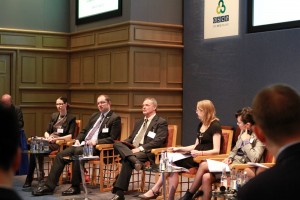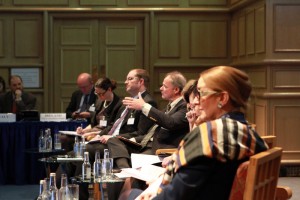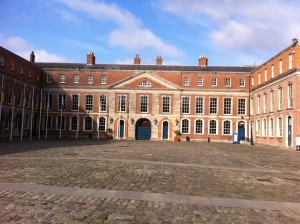 From 22 – 24 April 2012, the Organisation for Security and Co-operation in Europe (OSCE) held a meeting in Dublin about “Promoting Good Governance and Combating Corruption in Support of Socio-Economic Development”. I was invited as a panellist for the Session “The key role of civil society towards developing comprehensive and effective anti-corruption approaches”.
From 22 – 24 April 2012, the Organisation for Security and Co-operation in Europe (OSCE) held a meeting in Dublin about “Promoting Good Governance and Combating Corruption in Support of Socio-Economic Development”. I was invited as a panellist for the Session “The key role of civil society towards developing comprehensive and effective anti-corruption approaches”.
My contribution was about the eCitizen Charter as a tool for citizen engagement and social accountability. The invitation was a follow up on two previous meetings organized last year about the same topic, held in Vienna (UNDESA) and Marrakesh (UNCAC).
This panel (photos courtesy OSCE), scheduled at the beginning of the second day, was moderated by Elaine Byrne, an Irish journalist and political scientist. She just this week published a book entitled “Political Corruption in Ireland 1922-2010”.
 In my contribution I stressed the importance of clear “rules of engagement” between citizen and governmment. The eCitizen Charter provides a framework which empowers civil society. The use of social media has shown to be effective in fighting corruption, notably in the Arabic world. My plea for participative democracy as a necessary supplement to representative democracy was supported by other speakers later that day.
In my contribution I stressed the importance of clear “rules of engagement” between citizen and governmment. The eCitizen Charter provides a framework which empowers civil society. The use of social media has shown to be effective in fighting corruption, notably in the Arabic world. My plea for participative democracy as a necessary supplement to representative democracy was supported by other speakers later that day.
Other panellists covered topics like training of civil servants (Georg Grabenweger from the International Anti-Corruption Academy and Violetta Yan from the Kirgiz OSCE Academy), transparent procedures (Anne-Christine Wegener of Transparency International), anti money loundering action by banks (Roxana Cefan of Raiffaisen Bank International) and monitoring the UNCAC traty (Londa Esadze of UN Transnational Crime and Corruption Centre). The moderator could summarise that in anti-corruption not one size fits all, but civil society indeed cannot be left out as partner in a comprehensive approach.
The OSCE is an organization under the UN Charter created during the Cold War as a West-East forum, and has 57 participating states from Europe, the former Soviet Union, USA, Canada. The meeting was attended by some 250 representatives from states, academia, civil society, private sector and NGOs.
The first day was devoted to an overview of instruments such as international frameworks, legal instuments and monitoring mechanisms for which the states are responsible. Ppreventing corruption by promoting a culture of integrity, transparency and accountability was also given attention, as were regulatory reforms in public procurement and countering bribery. The rest of the conference covered topics like simplification of business relations, integrity of customs and border services, and identifying and recovering stolen assets.
 The meeting, held in Dublin Castle was well organised by mr. Goran Svilanovič, Co-ordinatorof the OSCE Economic and Environmental Activities together with his colleagues Edelmira Campos Núñez and and Andrea Gredler. The background paper prepared by the OSCE secretariat convincingly argues the need for measures against corruption because of the econonomic costs and the losses in trust it causes. Corruption exits everywhere, but it does make a difference whether is has become a fact of life that is tolerated, or whether it is considered as an evil that should be erradicated.
The meeting, held in Dublin Castle was well organised by mr. Goran Svilanovič, Co-ordinatorof the OSCE Economic and Environmental Activities together with his colleagues Edelmira Campos Núñez and and Andrea Gredler. The background paper prepared by the OSCE secretariat convincingly argues the need for measures against corruption because of the econonomic costs and the losses in trust it causes. Corruption exits everywhere, but it does make a difference whether is has become a fact of life that is tolerated, or whether it is considered as an evil that should be erradicated.
This Dublin event actally was the Second Preparatory Meeting for the September 2012 OSCE Forum on “Promoting Security and Stability through Good Governance”. Because of the busy agenda, an approach that got less attention than it deserves was social media and internet. However, during the closing session both the host of the meeting, the Irish Minister of Justice , and the American Ambassador recommended a robust role by civil society in anticorruption measures as an item on the agenda at the Good Governance meeting later this year in Prague.
The eCitizenCharter is translated in 22 languages, to be found under Downloads